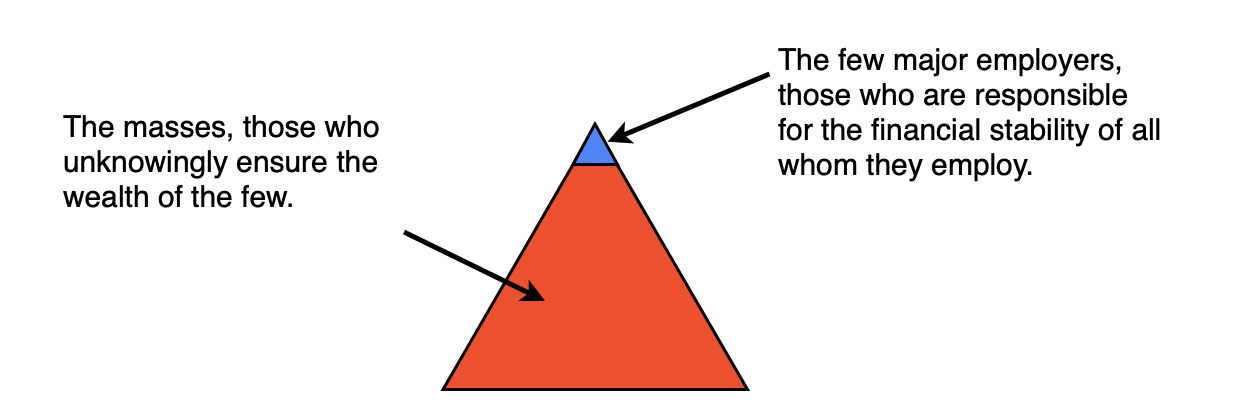An examination of modern capitalism, originally entitled "Capitalism: The Financial Oligarchy"
read moreModern capitalism and democracy methodologically oppose. Capitalism in America has evolved to the point where those who have achieved control over the movement of money are controllers of the unborn.

Those who control the financial atmosphere (i.e. where others can enter in, in what financial state they enter it), control the masses, to a surprising degree. The masses are left blind, knowing no other way of life. The masses are fed horror stories of attempts for social justice, equality, to such a degree that words like “communism” or “socialism” wreak of negativity. Once the idea of “no alternative” is fitted nicely into each hard worker’s mind, the pecuniary elite are free to exploit them. Economically speaking, it seems as though for one person to win, another has to lose. This loss does not necessarily have to take the form of a fiscal loss, but may be an effort loss. For instance, improper compensation for work. This exploitation comes in many forms, the primary way it has come about in the United States is by creating an economic system in which a newcomer must opt-out or be exploited by the elite. This comes in many stages, the first is likely in the form of student loans. Let us approach the decision every student must face, going to college, or not. Weighing the benefits, we see that an average annual income of a High School graduate is $30,400, while a Bachelor’s degree is $52,200. This is quite a disparate difference, and the net long term benefit (including interest on loans) is undoubtedly in favor of the Bachelor’s. This is playing into the hands of the elite, for they are the beneficiaries of these loans. Assuming the return is greater than the default, they made money simply by having some to temporarily dispense. The elite continue by being the primary employers, paying just above the brink of revolt to maximize personal earnings. It seems an underlying theme is seen throughout an entire overview of a capitalist (at least America’s) society: the more money you have, the more money you save, therefore you have more money, and you continue to save. Simply by looking at the previous statement, one can conclude the graph would resemble exponential growth (perhaps reaching the limit e , although, considering these economies are what one may consider artificial, it may approach a different, perhaps changing limit). Regardless, one may see the increased disparity between the affluent and the financially unfortunate, driven by the greed of the elite. Although capitalism is often associated with (ideal) democracy, it is quite the opposite (in practice). Democracy is founded on the notion that the masses rule, in terms of America, they rule through a small representation (thus making the political structure a democratic-republic). This is obviously the opposite of capitalism in practice. The issue in America, is when lobbyists (whose influence on this representative body may correlate with wealth) who don’t necessarily represent the vested interests of the people, but rather the elite, alter political decisions. Another stage is home owning, one purchases a house, almost always more than the necessities, the proportion between how much more than the necessities one purchases is related to how much money one has, although we can assume that the relation remains primarily constant. In order to pay for the house, one seldom finds them self in a position in which one’s wants can be satisfied without taking out a loan. This is likely because the magnitude of one’s wants correlates to how much money one has. In other words, people typically want what is just above their reach. Banks exploit this, permitting loans that are designed to give people what they want, but covertly exploit them in the long run. For instance, due to interest, paying $728,000 for a house that costs only $250,000 (personal example). I do not see how anybody could see that as reasonable, and yet the majority of families abide by it. As the bank owners became/become more greedy, they allow more and more families to purchase loans, loans that will almost inevitably lead to eviction. All of this, just because some millionaire wants to raise his salary by a few thousand.
What one sees is the growing greed of the elite, likely because of more expensive opportunities becoming available. This leads to a growing number of people becoming overtly exploited, which galvanizes revolt. When the number of overtly exploited reaches a given threshold (e.g. half of the middle middle class and all those below), an overthrowing of the elite may become possible.
To some degrees, all economic or political systems work well. But in terms of modern capitalism, those who make the decisions that are rightly considered immoral, make them in the safety of their office.